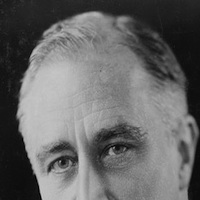Posts Tagged ‘fdr’
Public Employee Unions, One Man’s Opinion
Anyone care to guess who said this: “… Meticulous attention should be paid to the special relationships and obligations of public servants to the public itself and to the government. All Government employees should realize that the process of collective bargaining, as usually understood, cannot be transplanted into the public service. It has its distinct…
Read MoreRights guaranteed – responsibilities not required
How come liberals talk about rights that should be guaranteed, but not responsibilities required? I would think that if you are going to be guaranteed rights by the state, the state would set detailed responsibilities from those benefiting from those rights. Author note: While I’m away from the computer, I’m republishing my top 20 posts…
Read MoreFDR’s New Deal stifled economy for 15 years
So why did the Great Depression last for more than 15 years? In 2009, many think the United States could be in a 1929 situation, where the government has the opportunity to take action by spending more cash, or let the capitalist system loose, cutting taxes and letting the free market run. In the 1930s,…
Read MoreRights guaranteed – responsibilities not required
How come liberals talk about rights that should be guaranteed, but not responsibilities required? I would think that if you are going to be guaranteed rights by the state, the state would set detailed responsibilities from those benefiting from those rights. This mornings post by Scott Johnson at Power Line – Obama’s Constitution – should…
Read MoreThe growing government hand – looking back
M. Jay Wells at American Thinker has put together a time line wrapping together – year by year – how the mortgage crisis happened. It’s a long post, but worth your time this Sunday morning. The piece outlines choices made by our elected leaders – and influence by organizations like ACORN – going back to…
Read More
